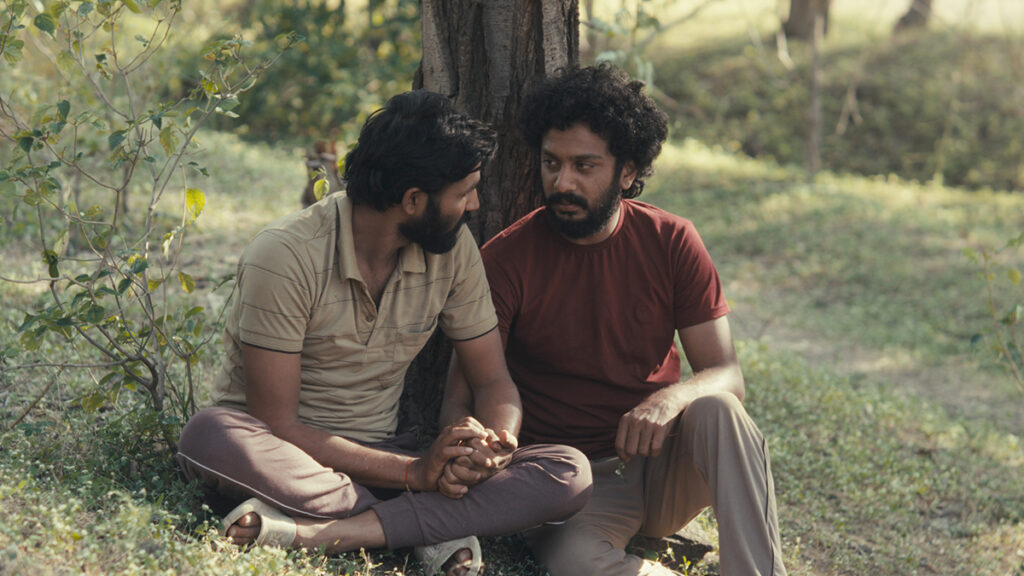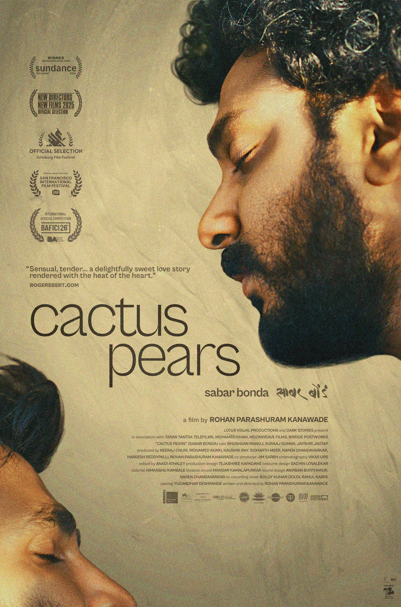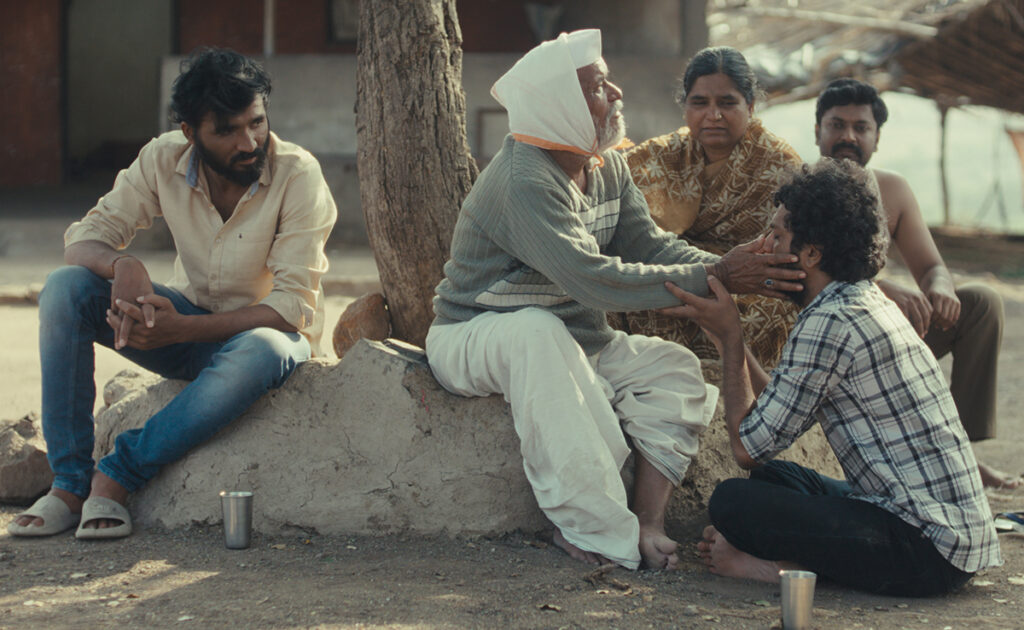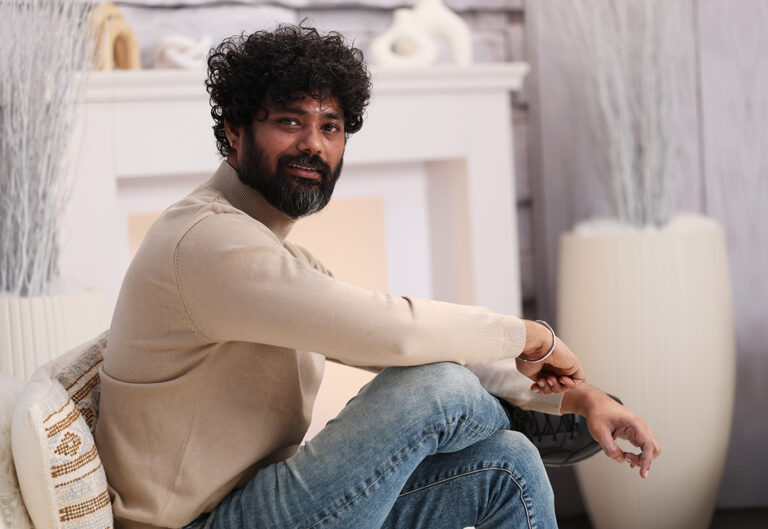Rohan Parashuram Kanawade’s feature debut “Sabar Bonda“ is a same-sex romance set over a period of 10 days and against a rural backdrop. It is tonally optimistic rather than sombre despite its underlying theme of grief). It has finally found an audience, thanks to an award-winning run at Sundance 2025, where it made cinema history as the first Marathi language film ever to premiere at the festival.
However, the road to Sundance, SXSW, and eventual theatrical distribution has been long in the making. In this interview, Kanawade delves into the highs and lows of filmmaking, sticking by his vision, on overthrowing stereotypes or generalisations regarding queer representation/acceptance on the big screen. He speaks of the need for distributors to wake up and smell the coffee, as well as the need of the hour—for not just naturally impactful queer stories, but overall good narratives that translate to good cinema.
*This interview had been edited for clarity.
Vidal D’Costa for The Movie Buff: Congratulations on all the acclaim and accolades for ‘Sabar Bonda.’ Could you share with readers about how and when you got your start in filmmaking and your prior body of work?
Rohan Kanawade: I’m not a trained filmmaker. I studied and worked in interior design. I started exploring filmmaking since I’d written some short stories and, at the insistence of my colleague, made a short film for a competition in 2007. That was my first film ever, shot on a colleague’s phone with a cast also comprising of colleagues, edited on another colleague’s computer. The editing process involved lots of crashes, obviously, as his computer was a home PC, and thus not equipped for the job! Unfortunately, our amateur short didn’t make the cut that year, but the whole process of creating was so exciting so I gained confidence to try again.
I went ahead with my second short (also filmed on the colleague’s phone), in which my parents were the primary actors andshowed the finished work to everyone in the neighbourhood; my colleagues & they further gave me a boost. I kept making movies—a third one, a fourth one—and that’s how the journey began. My dad noticed I was spending so much time in this field, so he encouraged me to switch careers, but also advised me to do so with complete passion and honesty.
Through friends, I started networking with professional actors and received support and guidance from the fraternity. Internet access was a game changer since I would watch interviews with other writers to learn the craft, read scripts and watch movies through a film library, which helped a great deal. Whenever I watched movies via the film library, I would also check out the bonus features/behind the scenes featurettes to gain a better understanding of the on-set atmosphere. Of course, just making a short film helped hone my skills, and when you actually make a movie yourself, you learn a lot. So that was my film school. It might have taken time to make my first feature, but I consider it time well spent to learn the ropes.
I’m very thankful to everyone who supported me in this long journey and who made it all possible.“
Rohan Kanawade
One of my short films was eventually selected at the KASHISH Pride Film Festival. There I won the ‘Emerging Filmmaker’ award and this made me realise I was on the right path. Exposure at Kashish led to a distribution deal, and my short film was even released theatrically in eight major cities (that was such a dream come true!) Some other short films, “Sundar” & “U for Usha” were screened in the UK, received prestigious honours like the ‘Satyajit Ray award.’ Travelling to these festivals/events was my first international trip. For me, visiting these international festivals was not just about the awards, but it also helped get my foot in, more networking opportunities, etc.
I only write to make a film, and I use the medium of cinema to feed this curiosity and interest in filmmaking. With each film, I strive to improve on my quality of writing, certain technical aspects, etc.
I’m very thankful to everyone who supported me in this long journey and who made it all possible. My father, my partner of 11 years, my colleagues at my part-time interior design job, and Neeraj Churi, who produced my short films and now “Sabar Bonda” (Cactus Pears) too. ‘m so grateful for the amazing audience who showered love towards my feature film, at Sundance too, where it became the first Indian fiction film to win the ‘Grand Jury Dramatic’ award (World Cinema category).
VD: Who are some fellow creatives/filmmakers you look up to or who influence your own work?

RK: Among contemporary filmmakers, the Austrian filmmaker Michael Haneke, Japanese filmmaker Hirokazu Koreeda, Turkish filmmaker Nuri Bilge Ceylan and their works played a role in developing my personal creative voice/storytelling choices, and how I want to tell my stories. Their films felt like a visual novel where you can see their unique vision in each frame, and so you feel only they can tell these stories in their way. I’d never seen such films or even such performances. These filmmakers inspired me to make movies that only I can make. I found a one-and-a-half hour long behind the scenes featurette of “Once Upon A Time in Anatolia” (the bonus features of Bilge Ceylan’s work are especially easily accessible). The way he collaborates with the cast, cinematographers and his work etiquette/on set demeanour along with his movies influenced me a lot.
What I try to do now is when I’ve an idea for a film, I listen and toy with it for a long time. I begin to see images or visual notes, so what I see will dictate how I’ll tell the story. It’s a different vision for each movie, for each story. When you compare my short films to “Sabar Bonda,” you can also feel and see how I try to bring in a contrast—be it in the visuals, sound design, storytelling—everything is so distinct.
I’d recommend all these aforementioned amazing filmmakers to anyone interested in filmmaking or to cinephiles, along with Indian filmmakers like Satyajit Ray (I’ve been watching Ray’s work since childhood), as well as Marathi filmmaker Jabbar Patel, whose work I absolutely love.
VD: While ‘Sabar Bonda’ has garnered praise overseas, captivated at Sundance, and even in online spaces, the job of an independent filmmaker isn’t exactly smooth sailing and of course. What are some hurdles you’ve had to overcome during the initial stages, either in the stories you wish to tell or in the distribution process?
RK: As an independent filmmaker, the vision (or my way of telling the story) for “Sabar Bonda” was something you just don’t see in regular Indian films. The actual hurdle was to preserve that vision itself. There’s no background score/music, the camerawork is static and consists of long takes, and it features novice leads. People weren’t sold on such ‘unorthodox’ aspects and I faced this challenge head-on, of making people believe in my vision or what I saw in my movie.
I incorporated the customs/rituals I had to carry out during my own grieving process into this premise to keep it grounded.
Rohan Kanawade
Finding financiers and supporters was still a hurdle. During the scripting stage, we had even visited big platforms to sell it, like Venice Biennale, NFDC (twice) and other film markets, but alas, no takers. But I was adamant/insistent on making this movie and telling this story my way since it’s the best way. We (Neeraj and I) ended up waiting 4 years. I remember worrying we wouldn’t hit the specific timeline of filming in winter and having to wait another year. Then—Neeraj understood my dilemma and mortgaged his own house to fund this film. This brave act showed how much he equally loved this movie and wanted to see my vision achieve fruition, especially.
When your movie is so different from other works, it becomes even more so difficult or acceptable. But we believed, and our persistence bore fruit. Later, many other collaborators came on board during post-production so I’m grateful to them too. Even distributors initially rejected it… Until Sundance happened, then they turned a new leaf. This in turn led me to retrospect over whether these were actually the right people since they only felt attracted by awards. I placed my belief only in those who stuck by the film even before Sundance, and now I’ve partnered with them for theatrical distribution (in the US, India, Europe, etc).
The regular audience’s love is yet another measure of people wanting good cinema. Hopefully, the distributors will change their minds and perspectives by watching the movie themselves, along with the audience too. The audience appreciation should pull them out of their closed-off world of sending out countless rejection emails, and into the ground reality of what constitutes good cinema, as well as what actually pulls the audience to a film or a good story. I’m just really happy to Sundance for giving this movie a chance at achieving what it deserves—a wide audience after a painful struggle of last five years.

VD: On to the movie itsel. I was impressed by the simplicity of the story, the characters, the relationships, and the rural setting. Additionally, I was also impressed with the sensitivity with which you’ve portrayed queer love on-screen. It felt very reminiscent to Onir’s work, but also unique in itself. How did the idea for ‘Sabar Bonda’ take root, and any personal experiences that shaped it?
RK: So, the idea for “Sabar Bonda” stemmed when I was grieving for my own father in my ancestral village back in 2016. The character Anand being pressured into marriage is also based on my own struggles with the same. During those moments, I wished for a friend in the village whom I could sneak out with to escape. This kernel stayed with me and prompted me to weave a story, especially a tender romance. While I didn’t set out to make a queer film, I did notice that cinema is inundated with queer tragedy or trauma. I wanted to subvert this, so my movie begins with a tragedy in the family and ends on an optimistic note.
I incorporated the customs/rituals that I had to carry out during my own grieving process into this interesting premise, to keep it grounded. A lot of people are of the opinion that ‘queerness is a Western concept’ so that’s how I added an authentically Indian touch.
I drew on most of my experiences of growing up in the Mumbai slums and my ancestral village. [I tried] to create something lived in, plus my own experience of coming out to my parents. My father worked as a driver [and]my mother is illiterate, yet still they accepted me without question. Their reaction led to questions of how cinema portrays a one-sided picture of acceptance, of only struggle or trauma. My personal experience reflected the opposite… no drama, not much emotional baggage, and so I wanted to show this other side to viewers too. I wanted to show the love of both the parents who accepted their child’s sexuality as well as the happiness/pride of the son in turn who grows up in a comforting environment. In my opinion, if acceptance can be this simple, why complicate it in the movies?
Simplicity [also]guarantees a bigger impact and can be more touching. People will say “this was so simple” after watching the scenes of the parents accepting their son. I have many friends here in India whose parents are equally supportive and accepted their child without any drama or trauma, so I drew on this to craft a positive outlook, rather than a generalisation or negative approach. It might make a difference for some people, help them accept their kids…I just hope it happens.
Warmth and positivity is such a feel-good experience. Even though “Sabar Bonda” deals with Anand’s grief, I knew from the start I didn’t want to make a sob story either. I want audiences to feel enveloped by a warm hug when they sit down to watch it. This adds to the running simplicity. [It’s] a word I also used with my actors, whom I advised to ‘not act’, just bring simplicity through performance and thus, leave a bigger impact or impression.
My intention was to normalise queerness in the same way heterosexuality is portrayed on-screen.
Rohan Kanawade
I’m lucky to have found company in brilliant actors, my cinematographer Vikas Urs, who captured the rural life according to my vision, without that ‘exotic’ lens. I spent summers as a child in these very villages, so I’m familiar with the people and their style of speaking as well, but simultaneously didn’t want the movie to come across as a documentary. My DOP understood the assignment. One of the reasons I request people to catch “Sabar Bonda” strictly in theatres is so that they can also notice or appreciate the hard work that went into sound design, the little details, the visuals, etc. I’ve personally received compliments on the same from screenings I’ve attended so far. The movie is not meant for the small screen. It’s about the simplicity of both urban and rural areas, which shines through.
I also incorporated the experiences of other people, one of which is the closeness and love shared between Anand and his mother. This is not based on my own personal experience but on those of my partner and his mother (she passed away last year but I was witness to their sweet interactions when she was alive). It also formed the basis for the scene between Anand and his father. I wish to create life on-screen and hope I’ve done justice to that.
VD: The central romance and intimacy too felt very organic. I would love to know the creative process, particularly working with the two lead actors, Bhushaan Manoj and Suraaj Suman. How did you ensure the passion exuded by or shared between Anand and Balya shone through or translated to the big screen? Did the actors offer any creative input during filming as well?

RK: I didn’t want to create any stereotypical characters. My intention was to normalise queerness in the same way heterosexuality is portrayed on-screen. I personally think sexuality is just a small part of one’s life, although I understand it is an identity for some people. The romantic leads are human, which was my only brief to the actors. Even during auditions, Bhushaan Manoj and Suraaj Suman understood the tone of my movie perfectly and didn’t play a stereotype, which was why I cast them. They’re both theatre actors and not only co-actors but actually best friends. I discovered about the real-life friendship between these two by chance, and it worked like a charm! They just recreated that off-screen chemistry and it translated to on-screen intimacy very effortlessly.
Before filming began, the cast and I gathered on Zoom to rehearse and do a table read (due to a lack of budget and transport issues, meeting offline or in different cities proved to be difficult). I would share the thoughts running through my head and tweak their performances accordingly. This continued for two months, and then on the days of filming, I shaped and polished up their physical performances on set. If the creative suggestions of the cast fit with my vision, I’d incorporate that too. I received and heard a lot of input, and we all collaborated to ensure it was a smooth experience.
VD: Lastly, could you share details regarding any upcoming works that our readers can look forward to? Are there any genres, subgenres and topics you are keen on exploring through the cinematic medium?
RK: I [have]ideas but can’t say where they’ll lead me. Nothing concrete as of now since they’re only floating around in my head, and I’m yet to explore them further or work on any new film as yet. [I’m] currently just enjoying and being appreciative of this new chapter “Sabar Bonda” has opened up, just travelling with the film. I’m watching the film with a different audience every time, in a different country.
I’m currently just enjoying being appreciative of this new chapter “Sabar Bonda” has opened up.
Rohan Kanawade
Apart from travelling the world right now with “Sabar Bonda,” I’m also working on securing theatrical releases for the same. It’ll be distributed in North America and some European territories first, and then I’m hoping for an Indian theatrical release too, so the regular movie-going crowd can also go see it in cinema halls.
So, I’m still mentally and emotionally overwhelmed from the ongoing journey that “Sabar Bonda” is taking me on, but hopefully I can put out a new film into the world once I’ve finished processing or am feeling revitalised. Thank you.
The Movie Buff thanks Rohan Parashuram Kanawade for taking the time to speak to us about “Sabar Bonda” and wish him success in the future. “Sabar Bonda” is set for a UK premier at the SXSW London festival (screening dates 2nd and 7th June).


